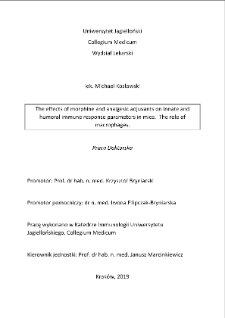Obiekt
Tytuł: The effects of morphine and analgesic adjuvants on innate and humoral immune response parameters in mice : the role of macrophages
Abstrakt:
Background. Macrophages are a versatile group of phagocytic cells responsible for fulfilling a variety of immune functions, most notably for mounting the initial anti-microbial response and for the clearance of cellular debris and apoptotic bodies. Thus, macrophages play an important role in innate immunity, as they are able either to activate and promote acute inflammation against pathogen or to counteract immune response against self-antigens. Additionally, macrophages function as antigen presenting and effector cells, helping to induce the adaptive, humoral, and cellular immune response. Methods. Macrophages from mice treated with morphine with or without an analgesic adjuvant (gabapentin, amitriptyline, or venlafaxine), or from mice treated solely with an antidepressant (imipramine, fluoxetine, or moclobemide), were either subjected to reactive oxygen intermediates chemiluminescence assay, cultured to _ evaluate the generation of cytokines, or were pulsed with either corpuscular antigen or hapten and transferred to naive recipients to induce humoral or cellular response, respectively. Active contact hypersensitivity was also elicited in drug-treated mice. Phagocytosis assay was performed in the case of mice treated with morphine with or without gabapentin, amitriptyline or venlafaxine. Reactive oxygen intermediates assay was also performed in macrophages from mice treated ; with the previously unstudied opioids oxycodone and buprenorphine. Results. We observed that repeatedly administered morphine and analgesic adjuvants reduced antigen phagocytosis by macrophages. Analgesic adjuvants, with the exception of imipramine, tended to decrease the production of reactive oxygen intermediates and nitric oxide, with amitriptyline having the greatest effect. Further, amitriptyline with morphine enhanced basal secretion of cytokines by macrophages, and all analgesic adjuvants, fluoxetine, and moclobemide tended to decrease LPS-stimulated release of pro- inflammatory cytokines. Morphine and analgesic adjuvants impacted the expression of phagocytosis and antigen-presentation markers on macrophages, which led to the reduced ability of morphine-affected macrophages to induce B-cell secretion of specific antibodies, and the addition of AAs strengthened this effect. Finally, gabapentin, venlafaxine, and imipramine suppressed the contact hypersensitivity reaction, while amitriptyline seemed to have the opposite effect. Conclusions. Our studies demonstrated a significant anti inflammatory activity of analgesic adjuvants across a broad spectrum of macrophage immune functions, which is likely critical to their analgesic activity supporting the beneficial effect of morphine.
Miejsce wydania:
Stopień studiów:
Dyscyplina:
Instytucja nadająca tytuł:
Promotor:
Bryniarski, Krzysztof ; Filipczak-Bryniarska, Iwona
Data wydania:
Identyfikator:
Sygnatura:
Język:
Prawa dostępu:
Kolekcje, do których przypisany jest obiekt:
Data ostatniej modyfikacji:
26 cze 2023
Data dodania obiektu:
17 cze 2020
Liczba wyświetleń treści obiektu:
174
Liczba wyświetleń treści obiektu w formacie PDF
230
Wszystkie dostępne wersje tego obiektu:
http://dl.cm-uj.krakow.pl:8080/publication/4326
Wyświetl opis w formacie RDF:
Wyświetl opis w formacie OAI-PMH:
| Nazwa wydania | Data |
|---|---|
| ZB-131186 | 26 cze 2023 |
Obiekty
Podobne
Kozlowski, Michael
Bryniarski, Paweł
Strzępa, Anna
Filipczak-Bryniarska, Iwona.
Jagła, Grzegorz
Tomaszek, Lucyna
Ciszek-Lenda, Marta.
Stec, Małgorzata

